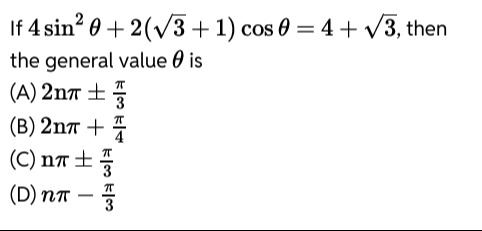Question
Question: If $4\sin^2\theta + 2(\sqrt{3}+1)\cos\theta = 4+\sqrt{3}$, then the general value $\theta$ is...
If 4sin2θ+2(3+1)cosθ=4+3, then the general value θ is

A
2n\pi \pm \frac{\pi}{3}
B
2n\pi + \frac{\pi}{4}
C
n\pi \pm \frac{\pi}{3}
D
n\pi - \frac{\pi}{3}
Answer
2n\pi \pm \frac{\pi}{3}
Explanation
Solution
The given equation is 4sin2θ+2(3+1)cosθ=4+3. Using sin2θ=1−cos2θ, we get: 4(1−cos2θ)+2(3+1)cosθ=4+3 4−4cos2θ+2(3+1)cosθ=4+3 −4cos2θ+2(3+1)cosθ−3=0 4cos2θ−2(3+1)cosθ+3=0 Let x=cosθ. Then 4x2−2(3+1)x+3=0. Factoring this quadratic equation: (2x−3)(2x−1)=0 This gives x=23 or x=21. So, cosθ=23 or cosθ=21. For cosθ=21, the general solution is θ=2nπ±3π. For cosθ=23, the general solution is θ=2nπ±6π. Option (A) matches one of the general solutions.
